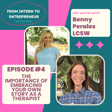
Episode 11: Internship Supervision Chat With My LPC Supervisor - Dr. Ryan Bowers
Click here to join the From Intern To Entrepreneur Facebook community!
From Intern to Entrepreneur is the podcast for counseling graduate students (and other grad students in mental health fields) to start planning their journey to private practice while they're still in graduate school! Host, Cori White, started planning her journey while she was still in her graduate program and it paid off BIG to start planning EARLY.
In this episode of From Intern to Entrepreneur, Cori interviews HER old licensure supervisor - Dr. Ryan Bowers! They chat about:
- His journey to becoming a counselor, professor, and supervision expert
- How he has used his mentors to guide his career
- How he defines supervision and what good supervision looks like during your internship
- How to use your academic supervisors for support
More about Ryan:
Ryan Bowers is a Licensed Professional Counselor in Pennsylvania, a National Board-Certified Counselor, and a Certified Advanced Alcohol and Drug Counselor who has been practicing and conducting research on clinical and academic supervision since 2014. As a graduate of Duquesne University’s CACREP-Accredited Counselor Education Ph.D. program, Ryan was trained didactically and experientially on conducting supervision for both graduate students in counseling programs and with post-graduate professionals seeking licensure. Ryan has held teaching positions at various colleges and universities in Pennsylvania including, Immaculata University, Duquesne University, Philadelphia College of Osteopathic Medicine, Kutztown University, Albright College, Elizabethtown College, and Lehigh Carbon Community College. He is also the owner of Epistemic Consulting Service, LLC where he provides clinical mental health and substance use counseling to individuals, couples, and families. Ryan uses the Discrimination Model of Supervision (Bernard, 1979) and the Integrative Reflective Model of Group Supervision (Stinchfield, Hill, & Bowers, 2019) when working with students and post-masters professionals to help the counselors develop into ethical and effective clinicians.
Want to connect with Ryan? Connect with him below:
Website: www.ReadingECS.com
Email: info@readingecs.com













